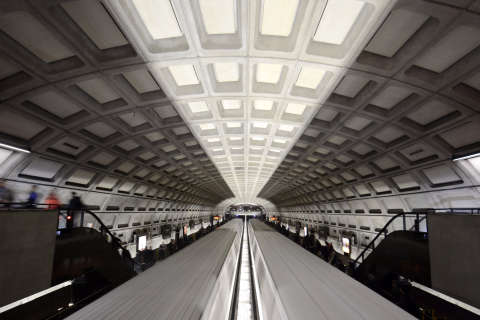WASHINGTON – Riders, workers and Metro leaders are reacting after the Metro Board voted Thursday to raise fares this summer for the first time in three years while cutting rush-hour schedules and service hours.
“We’re the ones who use it, so it’s like, without us, how are you all making money? The train’s just going to operate by itself with no people on the train?” said Chauniece Jones, who wore a shirt to the Metro Board meeting that read: “Vote no fare hikes. Metro not boomin.”
“I can’t afford to get a car right now. So it’s just like, I have to take Metro, and they don’t care about that,” she said. “That’s the problem. They care more so about the money than they care about us.”
Low-income riders are projected to face more significant fare increases than other riders when the changes to fares, hours and rush-hour rail schedules begin around July 1.
“How can you tell me that you’re charging people who can barely afford to survive day by day, because they’re making $8 an hour, $11.50 an hour and they have families to feed. … These are the things that these people don’t see,” said Jones, 23, who works in retail.
The president of Metro’s largest union, Amalgamated Transit Union Local 689, Jackie Jeter, said after the vote that the Metro Board ignored public opposition to service cuts and significant fare increases.
“They were hell-bent on doing what they wanted to do,” Jeter said.
Some Local 689 members have lost jobs as part of layoffs. The union contract expired last June, and no new deal has been reached.
Jeter said contract talks have broken down.
“We’ve been affected by it just like everyone else: We’ve lost positions. We’ve had actual layoffs and about 500 positions that have been frozen,” Jeter said.
Relations between the union and Metro management are at their worst during the decade that Jeter has led the union, she said, which has contributed to low morale.
“That’s probably the hardest part right now. The morale at Local 689 is very, very low,” Jeter said.
“And it’s low because not only are we facing the budget cuts, but there are rule implementations, disregard for agreements that have been made in the past, court cases that are being filed constantly. So it’s a lot of different things that has caused the morale to be as low as it is.”
This fall, Jeter warned that the service cuts and fare increases could send Metro further into a “death spiral” of continuing declines in the number of riders that fuel additional cuts in service.
This is Metro’s first fare increase in three years.
Rail fares will rise 10 cents per trip at rush hour and 25 cents all other times. Bus fares will rise 25 cents, while the airport bus (5A and B30) fares will rise 50 cents. Parking fees at rail stations will rise 10 cents too.
“There’s expenses tied to delivering that service, and it has to come from somewhere,” Metro General Manager Paul Wiedefeld said.
Some increased contributions from local governments and staff layoffs contributed to balancing the budget as well, said Wiedefeld, who has already warned of an even more significant budget shortfall coming next year.
Local governments worry they cannot bear the cost, and Wiedefeld promised Thursday to take a more emphatic role leading the push for dedicated capital funding for the system.
He promised specific, actionable plans for the region within a few weeks.
Wiedefeld believes that the July switch to scheduling trains for every 8 minutes at the ends of each line during rush hour rather than every 6 minutes could help Metro actually meet its advertised service levels.
“This is a very large system. It hasn’t been invested in at the level that we should have been investing over the years,” Wiedefeld said after the board meeting Thursday.
Riders, unfortunately, “have felt the pain of that,” he said.
To turn things around, Wiedefeld said, Metro has to do everything from getting more time for maintenance to “dealing with the financial realities.”
Wiedefeld believes that with the cut in service hours this summer and plans to improve maintenance practices across the system, things will get better.
“I think the performance level will go up … beginning July 1,” he said. “It’s not July 2, but basically that’s all moving us towards getting this much more reliable, and issues will happen, but I think they’ll get further and further apart and not as deep when they do happen.”






